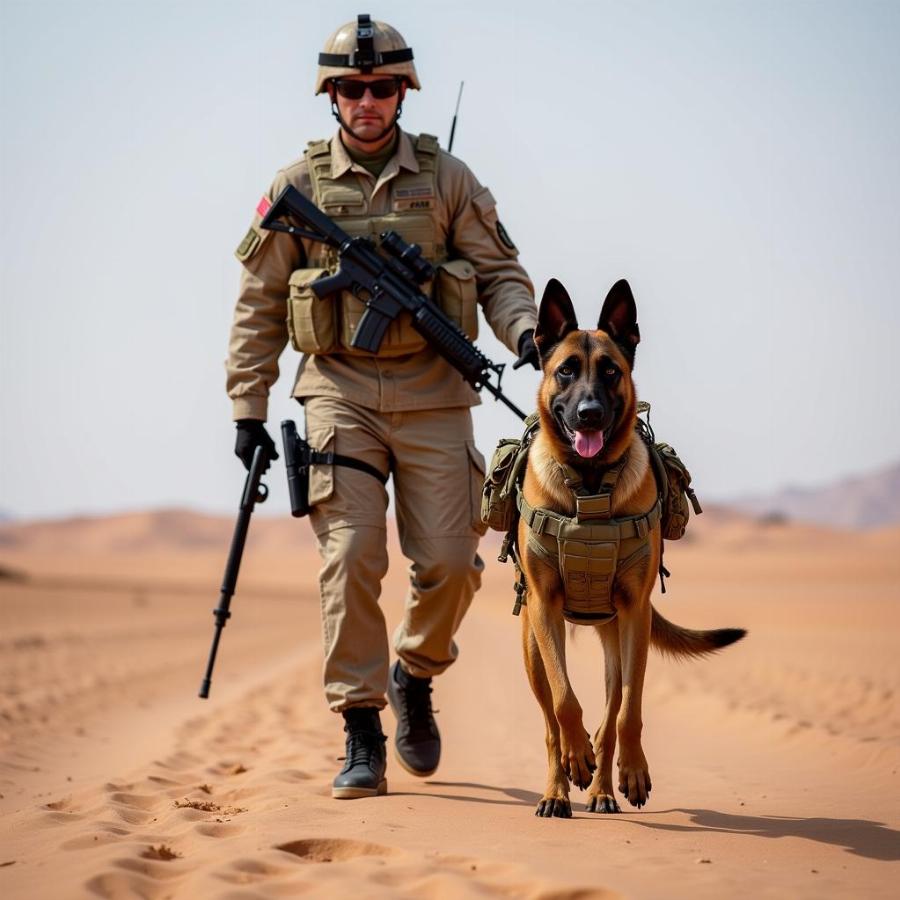The term “Devil Dog” evokes images of fierce loyalty, unwavering courage, and powerful presence. While often associated with the U.S. Marines, the moniker takes on a whole new meaning when we delve into the fascinating world of military working dogs, specifically those who served alongside the Marines in various conflicts. These canine heroes, often referred to as “Devil Dogs” themselves, have played a pivotal role in shaping military history, their unwavering dedication leaving an indelible mark on the battlefield and in the hearts of those they protected.
A Legacy Forged in Combat: From World Wars to Modern Warfare
The use of dogs in warfare dates back centuries, but the “Devil Dog” legacy truly began to take shape during World War II. The Marine Corps, recognizing the invaluable contribution dogs could make, officially introduced war dogs into their ranks. Doberman Pinschers, chosen for their intelligence, trainability, and unwavering loyalty, quickly rose to prominence. These courageous canines served as sentinels, messengers, and scouts, their keen senses alerting troops to enemy movement, sniffing out hidden explosives, and even engaging in direct combat, saving countless lives in the process.
More Than Just Mascots: The Vital Roles of “Devil Dogs”
While the image of a Doberman Pinscher as a mascot might be what first comes to mind, these dogs were, and continue to be, far more than symbolic figures. Their roles are as diverse as the Marines they serve alongside:
-
Sentry Dogs: Utilizing their superior hearing and smell, these vigilant guardians provide early warnings of enemy presence, often detecting threats long before human senses could.
-
Scout Dogs: Navigating treacherous terrain with ease, scout dogs venture ahead of troops, using their senses to identify potential ambushes, hidden enemy positions, and dangerous obstacles.
-
Explosive Detection Dogs: In an age where IEDs (Improvised Explosive Devices) pose a significant threat, these highly trained dogs use their exceptional sense of smell to locate and identify explosives, preventing casualties and saving lives.
-
Combat Tracker Dogs: These specialized canines utilize their powerful sense of smell to track enemy combatants, locate missing personnel, and pursue fleeing targets, proving invaluable in various combat scenarios.
 Modern-Day "Devil Dog" Team
Modern-Day "Devil Dog" Team
Beyond the Battlefield: The Unbreakable Bond
The relationship between a Marine and their “Devil Dog” extends far beyond the call of duty. It’s a bond forged in trust, respect, and shared experiences, often described as an unbreakable connection. These dogs are more than just partners; they are comrades, confidants, and a source of comfort amidst the chaos of combat. This profound connection highlights the emotional intelligence of these animals and their capacity for forming deep, meaningful bonds with their human counterparts.
The Doberman Legacy & The Rise of the Marine Devil Dog
While Doberman Pinschers solidified the “Devil Dog” image, other breeds have stepped into this vital role. Today, German Shepherds and Belgian Malinois are commonly seen working alongside Marines. These breeds, known for their intelligence, trainability, and athleticism, excel in the demanding environments where Marines operate. However, the Doberman’s legacy lives on, a testament to the unwavering bravery and dedication that earned them the moniker in the first place.
Honoring the Heroes: Remembering the Sacrifice
The contributions of “Devil Dogs” extend far beyond the battlefields. These canine heroes have shaped military history, saved countless lives, and provided unwavering companionship in the face of danger. It’s crucial to remember and honor their service, recognizing their sacrifice and the profound impact they’ve had on the lives of those they protected.
FAQs About “Devil Dogs”
1. Are “Devil Dogs” still used by the Marines today?
Absolutely! Military working dogs remain a vital asset to the Marines, playing active roles in various operations around the world.
2. What happens to “Devil Dogs” after their service?
Many “Devil Dogs” are adopted by their handlers or other service members, ensuring they enjoy a well-deserved retirement filled with love and care.
3. How can I support organizations that help “Devil Dogs”?
Numerous organizations are dedicated to the well-being of military working dogs. You can support them through donations, volunteering, or spreading awareness about their invaluable work.
Want to Learn More?
For more information on service dog Dobermans and the incredible stories of Devil Dogs Marines, explore our related articles on Beaut Dogs.
Beaut Dogs: Your Trusted Source for All Things Canine
Beaut Dogs is your one-stop resource for everything related to our canine companions. From breed information to training tips, we’re here to provide you with insightful and reliable content to help you navigate the wonderful world of dogs.
Have a question or need personalized advice? Contact us at [email protected], and our team of experts will be happy to assist you!